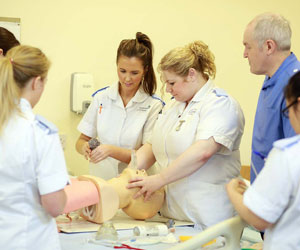Course outline
Course summary
Our flexible online programme was developed initially in collaboration with local ambulance services and employers to meet the educational needs of paramedics, it will see you gain the qualities and knowledge you need to become a high-calibre professional able to confidently deal with the changing dynamics of the health care economy. With paramedics taking on more in-depth roles in the care of patients, both in and out of the community, taking your knowledge and skills to a higher level will help you deal with the changing challenges whilst improving your career prospects. Our aim is to help you enhance your professional prospects and enable you to play an active role in developing your own practice. Therefore you can study module-by-module from your own home at a time that will fit around your shift pattern and day-to-day commitments. We have extensive experience as CPD distance learning providers. All tutors are experienced paramedics and clinicians within the NHS. Interactive online classrooms give you the opportunity to debate and discuss real-life scenarios and experiences with fellow students, so you won’t feel like you are learning alone.
Modules
Available modules
Core Modules
- Evidence Based Practice [ 20 credits ]
- Negotiated Learning [ 20 credits ] or Dissertation [ 40 credits ]
- Disaster Response [ 20 credits ]
Optional Modules
- Humanitarian Action [ 20 credits ]
- Clinical Reasoning and Assessment Skills in Healthcare (CRASH) [ 20 credits ]
- Emergency Clinical Decision Making and Problem Solving [ 20 credits ]
- Consultation and Physical Examination: Health Assessment Skills [ 20 credits ]
- Clinical Supervision [ 20 credits ]
- Leadership and Change [ 20 credits ]
- Work Based Learning [ 20 credits ]
- Negotiated Learning [ 20 credits ]
- Negotiated Learning [ 10 credits ]
Programme Specification
Assessment, Feedback, and Teaching and Learning methods
Timetables
Entry requirements
Entry Requirements
120 Level 4 and 120 Level 5 credits or Accreditation of Prior Experiential Learning (APEL) portfolio.
Selection criteria
Criteria for admission as per University admissions policy. Applicants must have successfully completed 120 level 4 credits and 120 level 5 credits (or equivalent) through prior paramedic training and be a qualified Paramedic, registered with the Health Care and Professions Council (HCPC) or an equivalent regulator and presently working in a HART team or similar appropriate setting. All applicants must complete a pre-entry study skills package such as HeadStart Plus if they are new to this level of study or have had a break from study for a period of 4 years.
Application information
Making your application
Applications should be made online directly to the university; visit our website or contact enquirycentre@cumbria.ac.uk for details and guidance. There is no official closing date but we would encourage you to apply as early as possible, as many courses are competitive.
What makes a good application?
We consider all aspects of your application, not simply your qualifications and grades. We look at your academic background and performance, relevant experience (particularly for professional courses where some voluntary or paid experience is required) and your reference. Above all, we look for motivation, commitment and potential-evidence that you can benefit from study at higher education level.
Make sure you include:
- Relevant qualifications/evidence of ability: check our website for the specific entry requirements required for each course. Tell us your previous academic results and your projected grades.
- A supportive reference, from an employer or your school or college.
- A good personal statement.
- Explain clearly what attracts you to the course and tell us about your wider interests and experience. If you are applying for a course that incorporates professional training and placements, you should include any relevant experience or visits you have made in the workplace. Highlight your individual strengths and qualities, personal skills, capacity for teamwork, contribution to the community and your enterprise, originality and determination. Select some activities which bring out these qualities.
What next?
When we receive your application, we will send you an acknowledgement and if you are successful at this stage you will get either an offer (with an invitation to visit the campus to which you have applied), or an invitation to interview on a particular date. If we are not able to offer you a place on your chosen course we will usually try to offer you a place on a similar course and will contact you to discuss this. Alternatively, if we think you are suitable, but cannot offer you a place on your preferred campus because of the level of competition, we will offer you a place at another campus if one is available.
And if I accept?
The admissions team will contact you and send further information from February onwards about accommodation, and from May/June onwards about preparing to join the university. If you have any other queries, please telephone the admissions offices for information and advice on 0845 6061144.
Deferred entry
We welcome applications for deferred entry on some courses. If you have specific plans during your year out, indicate these on your personal statement as they may be relevant to your course and could enhance your application.
International students
Applications for full-time undergraduate study are made through UCAS. Please see the of our website for full details of our entry requirements (including English-language skills) as well as contacts for advice and support.
From 2009 the UK Border Agency introduced a Points-Based Immigration System (PBS) for students coming to the UK from outside the European Economic Area (EEA). Students entering higher education will need to obtain a Confirmation of Acceptance (CAS) plus finance confirmation to obtain a Tier 4 student visa. UK education providers are licensed by the UK Border Agency. When students apply for their visa (or entry clearance) they will need a valid Certificate of Acceptance of Studies from the university. Please note that a CAS is not a guarantee that a visa will be issued.






